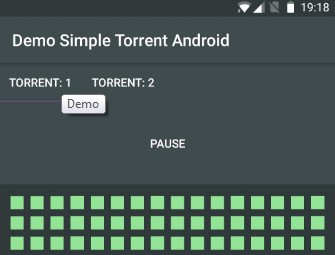A torrent client library for Android that utilizes frostwire-jlibtorrent

simple-torrent-android
An Android torrent client library powered by frostwire-jlibtorrent. It supports sequential and simultaneous downloads.

Usage
A single torrent download session is represented as the TorrentSession class. An instance of this class can be used to start, stop, pause, and resume a torrent download. When creating a new session, a TorrentSessionOptions instance along with a torrent Uri are required constructor parameters. The TorrentSessionOptions.Builder class can be used to create session options. The TorrentSessionListener interface can be implemented and set on the session to receive TorrentSessionStatus updates tied to the lifecycle of the torrent. The TorrentSessionBufferState is one of the properties of the status and represents the current state of the torrent piece buffer.
For example, the following code snippet sequentially downloads the largest file of the provided torrent to the downloads directory:
// http, https, magnet, file, and content Uri types are all supported.
val torrentUrl = Uri.parse("http://www.frostclick.com/torrents/video/animation/Big_Buck_Bunny_1080p_surround_frostclick.com_frostwire.com.torrent")
val timeoutSeconds = 60
val torrentSessionOptions = TorrentSessionOptions
.Builder(Environment.getExternalStoragePublicDirectory(Environment.DIRECTORY_DOWNLOADS))
.onlyDownloadLargestFile(true)
.anonymousMode(true)
.stream(true)
.build()
val torrentSession = TorrentSession(torrentUrl, torrentSessionOptions)
torrentSession.listener = object : TorrentSessionListener {
// Omitted for brevity
}
torrentSession.start(context, timeoutSeconds)
For a more detailed example, please see the sample application alongside this library (screenshot below).
Configuration
Add this in your root build.gradle at the end of repositories:
allprojects {
repositories {
maven { url "https://jitpack.io" }
}
}
and add the following in the dependent module:
dependencies {
implementation 'com.github.masterwok:simple-torrent-android:0.0.4'
}
unless you're a fan of large APKs, you'll probably want to add the following to the build.gradle of your app so an APK is generated per ABI:
android {
...
splits {
abi {
enable true
reset()
include 'armeabi-v7a', 'arm64-v8a', 'x86', 'x86_64'
universalApk false
}
}
}
// Map for the version code that gives each ABI a value.
ext.abiCodes = [
'armeabi-v7a': 1,
'arm64-v8a' : 2,
'x86' : 3,
'x86_64' : 4
]
import com.android.build.OutputFile
android.applicationVariants.all { variant ->
variant.outputs.each { output ->
def baseAbiVersionCode = project.ext.abiCodes.get(output.getFilter(OutputFile.ABI))
if (baseAbiVersionCode != null) {
output.versionCodeOverride = baseAbiVersionCode * 10000000 + variant.versionCode
}
}
}